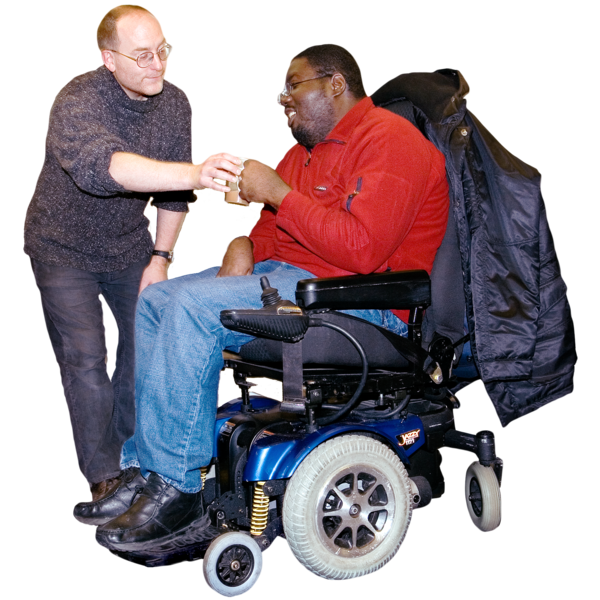Mencap has described the publication of the Department for
Education
 Education is when you learn things. When you fill in a form to get a job, education means you write where you went to school, college or university.
and the Department for Health and
Social Care
Education is when you learn things. When you fill in a form to get a job, education means you write where you went to school, college or university.
and the Department for Health and
Social Care
 Social care means the services that give care and support to people who need it.
’s
guidance
Social care means the services that give care and support to people who need it.
’s
guidance
 Guidance means being given clear instructions to be able to do something well.
on the use of physical restraint, and other restrictive interventions, on children with a
learning disability
Guidance means being given clear instructions to be able to do something well.
on the use of physical restraint, and other restrictive interventions, on children with a
learning disability
 A learning disability is to do with the way someone's brain works. It makes it harder for someone to learn, understand or do things.
, in schools and other settings as a welcome “first step”.
A learning disability is to do with the way someone's brain works. It makes it harder for someone to learn, understand or do things.
, in schools and other settings as a welcome “first step”.
However, the charity calls for
the government
 The Government are the people who run the country. The Government decide how much tax people should pay and how things like the National Health Service (NHS) should work.
to ensure the guidance is followed and to properly fund the right support that vulnerable children require, across special and mainstream education, health and social care, to reduce the risk of children with a learning disability being inappropriately restrained.
The Government are the people who run the country. The Government decide how much tax people should pay and how things like the National Health Service (NHS) should work.
to ensure the guidance is followed and to properly fund the right support that vulnerable children require, across special and mainstream education, health and social care, to reduce the risk of children with a learning disability being inappropriately restrained.
Dan Scorer, Head of Policy and Public Affairs at the learning disability charity Mencap, said:
“This long overdue guidance is a first step in addressing the unacceptable use of physical restraint, and other restrictive interventions, on children with a learning disability, in schools and other settings. Children, some as young as two, are being inappropriately restrained, which is resulting in injury and emotional harm. This is simply unacceptable.
“The guidance recognises the trauma and long term consequences on children’s health and wellbeing that restraint and restrictive practices can have, and it says that other approaches should be used, which can de-escalate the behaviour and tackle the reasons for it. However, the guidance is not statutory, so schools don’t have to follow it. The guidance also only applies to specialist settings, missing out mainstream schools where the majority of children with a learning disability are educated.
“Children with a learning disability are being put at risk in the very places that should be supporting and protecting them. Only last week NHS Digital revealed that there was the highest ever number of reported incidents of physical restraint used against people with a learning disability and/or autism
Autism is a disability. Autistic people find it difficult to understand what other people think and feel. They also find it difficult to tell people what they think and feel. Everyone with autism is different. trapped in inpatient units – over 3,000 in a single month, 770 of which were against children. We strongly urge the government to say how it will ensure this guidance is followed and to properly fund the right support that vulnerable children require, across special and mainstream education, health and social care, to reduce the risk of children with a learning disability being inappropriately restrained. Every child deserves to have the best possible start in life."
The guidance is published online here. The government also launched a consultation
Consultation is finding out what people think about something. on whether there is a need for further guidance on the use of restraint and restrictive intervention in mainstream schools, mainstream post-16 settings and educational settings offering alternative provision. The consultation can be found online here and closes on Thursday 17th October 2019.
-ENDS-
For further information or to arrange interviews, contact Mencap’s media team:
- email media@mencap.org.uk
- phone 020 7696 5414 (including out of hours).
Notes to editors
- A PDF report published by the
Challenging Behaviour
 Challenging behaviour can be when someone hurts themselves, hits or pinches someone else, or breaks something. Some people might behave like this because they are upset or because people do not understand them.
Foundation and Positive and Active Behaviour Support Scotland (PABSS) in January 2019 found significant negative physical and emotional impacts of restrictive intervention on both children and their families. 58% of families whose child experienced restraint said that it led to injury.
Challenging behaviour can be when someone hurts themselves, hits or pinches someone else, or breaks something. Some people might behave like this because they are upset or because people do not understand them.
Foundation and Positive and Active Behaviour Support Scotland (PABSS) in January 2019 found significant negative physical and emotional impacts of restrictive intervention on both children and their families. 58% of families whose child experienced restraint said that it led to injury. - A 2017 Freedom of Information request BBC 5 live Investigates to local authorities in England, Scotland and Wales revealed 13,000 physical restraints in schools in the past three years, resulting in 731 injuries. Less than a fifth of authorities were able to provide the data, with most saying they didn't keep the information, suggesting that this shocking figure is just the tip of the iceberg.
- According to data released by NHS Digital (June 2019), 2,250 people with a learning disability and/or autism remain locked away in in patient units - an increase from last month. Alarmingly the number of reported incidents of restrictive interventions e.g. physical restraint, has exceeded 3,000 in one month, for the first time since reporting began – 770 of which were against children [1]. And there has been no change in the number of children in these units for the past three months – at 240, it is more than double what it was when the Transforming Care programme began in March 2015.
About Mencap
There are 1.4 million people with a learning disability in the UK. Mencap works to support people with a learning disability, their families and carers by fighting to change laws, improve services and access to education,
employment
 Employment means having a job.
and
leisure
Employment means having a job.
and
leisure
 Leisure is when you have time to do things you enjoy like playing sports or going to the pub.
facilities. Mencap supports thousands of people with a learning disability to live their lives the way they want.
Leisure is when you have time to do things you enjoy like playing sports or going to the pub.
facilities. Mencap supports thousands of people with a learning disability to live their lives the way they want.
For advice and information about learning disability and Mencap services in your area, contact Mencap’s freephone Learning Disability Helpline on 0808 808 1111 (9am-3pm, Monday-Friday) or email helpline@mencap.org.uk .
What is a learning disability?
- A learning disability is a reduced intellectual ability which can cause problems with everyday tasks – for example shopping and cooking, or travelling to new places – which affects someone for their whole life;
- Learning disability is not a mental illness or a learning difficulty, such as
dyslexia
 Dyslexia is a learning difficulty. People who have dyslexia can find it hard to read, write and spell.
. Very often the term ‘learning difficulty’ is wrongly used interchangeably with ‘learning disability’;
Dyslexia is a learning difficulty. People who have dyslexia can find it hard to read, write and spell.
. Very often the term ‘learning difficulty’ is wrongly used interchangeably with ‘learning disability’; - People with a learning disability can take longer to learn new things and may need support to develop new skills, understand difficult information and engage with other people. The level of support someone needs is different with every individual. For example, someone with a severe learning disability might need much more support with daily tasks than someone with a mild learning disability.
[1] NHS Digital MHSDS Data: March 2019 published June 2019. Data started to be reported for October 2018.